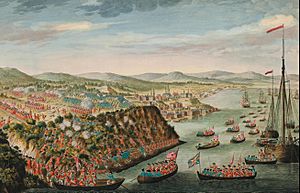Articles of Capitulation of Quebec facts for kids

The Articles of Capitulation of Quebec were an important agreement made during the Seven Years' War. This agreement was signed by Jean-Baptiste Nicolas Roch de Ramezay for the French side, and Admiral Sir Charles Saunders and General George Townshend for the British. They signed it on September 18, 1759. This happened shortly after the Battle of the Plains of Abraham, where the British won a major victory.
In the agreement, the British Army accepted all 11 demands made by De Ramsay. These demands included giving "honors of war" to the French soldiers. This meant they could leave with their weapons and flags. The agreement also protected civilians and their belongings. It allowed them to freely practice their Roman Catholic religion. A few months later, on April 28, 1760, the French Army tried to take back Quebec City at the Battle of Sainte-Foy. The French won this battle, but they couldn't retake the city. This was because they didn't have enough support from their navy. The French had to stop their siege after their navy lost a battle near Neuville.
Almost a year after Quebec surrendered, the government of New France also surrendered in Montreal. This happened on September 8, 1760, after a two-month British military campaign.
Contents
What Were the Articles of Capitulation?
The Articles of Capitulation were a list of demands made by the French commander, Mr. de Ramsay, when Quebec City surrendered. The British leaders, Admiral Saunders and General Townshend, then responded to each demand. This agreement officially handed over control of Quebec City to the British.
Key Demands and Agreements
The French had several important requests when they surrendered. The British agreed to most of them.
Military Agreements
- Honors of War: The French asked for "honors of war" for their soldiers. This meant the French troops, including land forces, marines, and sailors, could march out with their weapons, bags, and drums playing. They were allowed two French cannons and ammunition. The British agreed to this. The French soldiers were then sent to the first port in France.
- Giving Up Supplies: The French agreed to hand over all their artillery and military supplies. They also promised to make a list of everything. The British accepted this.
- Care for the Wounded: The French asked that sick and wounded soldiers, as well as doctors and hospital staff, be treated fairly. This was based on an agreement made earlier in the war. The British agreed to this demand.
Protecting People and Property
- Protecting Homes and Belongings: The French demanded that people living in Quebec could keep their homes, goods, and belongings. The British agreed, as long as the residents put down their weapons.
- No Punishment for Fighting: The French asked that residents not be punished for fighting to defend the city. They explained that people in colonies on both sides often served as militia (citizen soldiers). The British agreed to this.
- Protecting Absent Citizens' Property: The French wanted to make sure that the belongings of officers and citizens who were not in Quebec at the time would not be taken. The British agreed to this as well.
- Staying in Their Homes: The French asked that residents not be forced to leave their homes until the future of Canada was decided by a peace treaty between France and Britain. The British granted this request.
Freedom of Religion
- Practicing the Catholic Faith: A very important demand was that people could continue to practice the Catholic, Apostolic, and Roman religion freely. The French also asked for protection for churches and monasteries. They specifically wanted the Bishop of Quebec to be able to stay in the city and freely carry out his duties. The British agreed to allow the free practice of the Roman Catholic religion. They also promised protection for religious people and the Bishop, who could perform his duties freely until the future of Canada was decided.
Communication and Future Decisions
- Sending News: The French commander in Quebec wanted to send news of the city's surrender to the Governor General, the Marquis de Vaudreuil. He also wanted to inform the French government. The British agreed to this.
- Future of Quebec: The French asked that if a peace treaty returned Quebec to France, the surrender would be cancelled, and de Vaudreuil could return. The British response was that "Whatever the British King decides will be done." This meant the final decision rested with the British King.
The Articles of Capitulation were signed by Charles Saunders, George Townshend, and De Ramsay on September 18, 1759, outside Quebec.
 | William Lucy |
 | Charles Hayes |
 | Cleveland Robinson |

